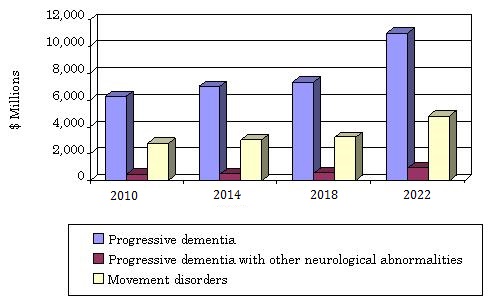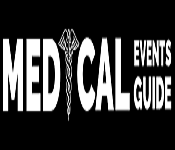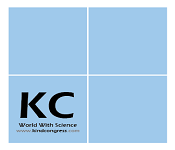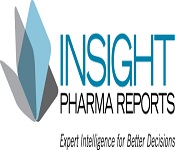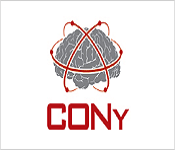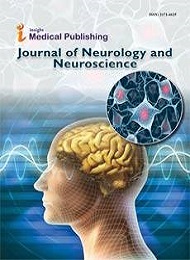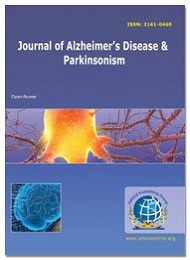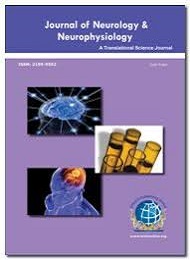Theme: New and Emerging Target Therapies in Dementia Care and Alzheimers disease
Dementia 2019 Osaka
It’s with great pleasure and a great honor to invite you to the “15th International Conference on Dementia and Alzheimers Disease” scheduled during March 25-26, 2019 at Osaka, Japan.
Welcome to the most exciting and fascinating city, Osaka, Japan!
Within this splendid setting, we plan to deliver a conference that will exceed your expectations. Our event aims to make people with dementia feel safe and to create a familiar environment for them.
During this year’s Conference, we hope that you will seize the opportunity to rekindle on-going connections and spark new ones with your colleagues from around the globe
The Conference will be organized around the theme “New and Emerging Target Therapies in Dementia Care and Alzheimer's disease”
Dementia 2019 anticipates more than 500 participants around the globe to experience thought-provoking Keynote lectures, Oral & Poster Presentations. This year conference will offer ample opportunities for all stakeholders working on Dementia, Alzheimer’s and neurology to expose their research work.
Our conference aims to gather the Researchers, principal investigators, experts, neurologists and researchers working on the brain from both academia and healthcare industry, Business Delegates, Scientists and students across the globe to provide an international forum for the dissemination of original research results, new ideas, and practical development experiences.
This year’s Conference program, coupled with the Business Opportunity Exchange, is an event you can’t afford to miss!
The scope of the Conference
15th International Conference on Dementia and Alzheimers Disease is organizing an outstanding Scientific Exhibition/Program and anticipates the world's leading Neurologists, health professionals involved in the profession and practice of neuroscience. The event will also reflect the interest of specialists in the clinical research on dementia and Alzheimer’s disease. Conference series organizing this international event for people to take part and gain a better understanding of such diseases, to access treatment as well as information, advice, and support and to have their health monitored more closely.
This International meeting is an effort to make possible interactions among world-leading scientists, research scholars, professionals, young researchers from different parts of the world to exchange their knowledge and conduct symposia, show experiments with new innovative techniques that disseminate information about clinical tradition, best practices, skills and knowledge in the field of neuroscience. In Dementia 2019, international symposiums, B2B meetings, international workshops will also be organized to discuss the specific topics in the field of Dementia and Neurology.
Target Audience:
- Neurologists and Directors
- Physicians
- Neuroscientists
- Specialists
- Researchers
- Healthcare professionals
- Professors
- Industrial Experts
- Neurosurgeons
- Psychiatrist
- Nutritional Scientists
- Lecturers and Students from Academia in the study of Dementia
- Students from Academia in the research of Neurology
- Neuro Physiotherapists
Dementia 2019 is focussing on various researches; to develop technologies to help people with dementia live as well as they can, for as long as they can. This research is crucial for the hope of a cure and for improvements in treatments and care. Through this Alzheimer’s disease and Dementia meeting, it will offer an extraordinary open door for members, agents ecumenically to meet, arrange, and see nascent logical connections for well suited adjust in life.
Session 1: Dementia | Dementia 2019 | Dementia and Alzheimers Conferences |
The word ‘dementia’ describes a set of symptoms include memory loss and difficulties with thinking or reasoning that reduce a person ability to perform everyday activities. Dementia is mainly caused when the brain is damaged by diseases, such as Alzheimer’s disease or a series of strokes. This disease mainly affects people over the age of 65 and the likelihood of developing dementia increases significantly with age. However, dementia can affect younger people too. Dementia is strongly linked with age, and the Netherlands and other European countries have an increasingly ageing population. Currently 16% of the European population is over 65, with this figure expected to reach 25% by 2030.
Session 2: Symptoms and diagnosis of dementia | Dementia Meetings | Neuroscience Conferences
Dementia is not a specific disease. It's an overall term that describes a group of symptoms associated with a decline in memory or other thinking skills severe enough to reduce a person's ability to perform everyday activities. Alzheimer's disease accounts for 60 to 80 per cent of cases. Vascular dementia, which occurs after a stroke, is the second most common dementia type. But there are many other conditions that can cause symptoms of dementia, including some that are reversible, such as thyroid problems and vitamin deficiencies.
Dementia is often incorrectly referred to as "senility" or "senile dementia," which reflects the formerly widespread but incorrect belief that serious mental decline is a normal part of aging.
There is no one test to determine if someone has dementia. Doctors diagnose Alzheimer's and other types of dementia based on a careful medical history, a physical examination, laboratory tests, and the characteristic changes in thinking, day-to-day function and behaviour associated with each type.
Session 3: Dementia care practice & awareness | Dementia Conferences | Alzheimers Conferences
Dementia is predominant disorder that affects more number of people around the world. . Diagnosis of the patient with Dementia frightens the person affected by the syndrome, their family members and caretakers. Better understanding about public awareness of Dementia aids more effective health and social policies. Dementia patients need assistance and full time care as much as drugs. Some common care practices in Dementia are assistance in food and fluid consumption, pain management, social engagement ensuring safety and security of Dementia patients. Main aim of care practices is to ensure cut in hospitalization and psychotropic drugs. Understanding patient’s mood changes, particular behaviour, speech problems and help in rectifying them. Dementia patients need end of life care so qualified nursing staff is needed. Few care practices which are used are indoor and outdoor activities, visual and audio stimulation, Art therapy. Care practices in Dementia have been critical to engage in International Dementia meetings. In need to evolve in Dementia care world gathering and genuine talks on Dementia care is required. The Dementia conference discusses public awareness as well as care practices to achieve higher rate of early diagnosis and to decrease the distress among the patient, family and caregivers.
Session 4: Alzheimer’s disease diagnosis and symptoms | Dementia Congress | Dementia Events
Alzheimer's can be defined as a gradually progressive neurodegenerative disease characterized of memory impairment and subsequent disturbances in personality, mood, reasoning and perception. It caused by a combination of lifestyle, genetic, and environmental factors that gradually impairs the brain.
It can be diagnosed by evaluating subjects medical history, testing mental and mood status (NINCDS-ADRDA), lab tests and brain scans. An on-going clinical trial conducted by Dominantly Inherited Alzheimer Network (DIAN), is to test whether antibodies to beta-amyloid can reduce the accumulation of beta-amyloid plaque in the brains with such genetic mutations and thereby reduce, delay or prevent symptoms and it can also be impeded by choosing the diet carefully.
Session 5: Alzheimer’s imaging and clinical trials | Alzheimers Meetings | Alzheimers Events
More than 400 clinical trials are presently looking at new treatments for Alzheimer’s disease (AD) and many of them are actively recruiting. Many of the researches are based on decreasing the toxic effects of amyloid-beta in the brain, targeting amyloid production, blocking the accumulation of amyloid-beta into plaques, Aiming at Tau, Improving Cognition with Serotonin and Dietary Supplements.
Session 6: Alzheimer’s pathophysiology | Dementia 2019 Conferences | Neurosurgery Conferences
Beta amyloid plaques and Neurofibrillary tangles of tau protein Pathology are prime suspects of neuronal cell death in Alzheimer’s it caused by accumulation of abnormally folded A-beta and tau proteins and Plaques of small peptides 39–43 amino acids to form Beta-amyloid which comprises amyloid precursor protein (APP) and a transmembrane protein that pierce the neuron's membrane. It later forms a fibrils of amyloid protein clump which get deposited in neurons to form a dense senile plaques, amyloid fibrils disrupts the cell’s calcium ions homeostasis and induces apoptosis of neurons which results in neurodegeneration affecting brain functioning.
Session 7: Parkinson’s disease | Parkinson’s Conferences | Neurology Conferences
Parkinson's disease is the second most common neurodegenerative disorder and the most common movement disorder. Characteristics of Parkinson’s disease are progressive loss of muscle control, which leads to trembling of the limbs and head while at rest, stiffness, slowness, and impaired balance. As symptoms worsen, it may become difficult to walk, talk, and complete simple tasks.
The progression of Parkinson's disease and the degree of impairment vary from person to person. Many people with Parkinson's disease live long productive lives, whereas others become disabled much more quickly. Complications of Parkinson’s such as falling-related injuries or pneumonia can cause premature death. However, studies of patent populations with and without Parkinson’s disease suggest the life expectancy for people with the disease is about the same as the general population.
Session 8: Dementia with lewy bodies | Dementia Conferences | Neurology Health Meetings
Most experts estimate that dementia with Lewy bodies is the third most common cause of dementia after Alzheimer's disease and vascular dementia, accounting for 10 to 25 percent of cases. Lewy bodies are also found in other brain disorders, including Alzheimer's disease and Parkinson's disease dementia. Many people with Parkinson's eventually develop problems with thinking and reasoning, and many people with DLB experience movement symptoms, such as hunched posture, rigid muscles, a shuffling walk and trouble initiating movement.
Session 9: Frontotemporal dementia | Neuroscience Meetings | Alzheimers Conferences 2019
Frontotemporal dementia (FTD) or frontotemporal degenerations refer to a group of disorders caused by progressive nerve cell loss in the brain's frontal lobes (the areas behind your forehead) or its temporal lobes (the regions behind your ears).
The diagnosis of bvFTD and PPA are based on expert evaluation by a doctor who is familiar with these disorders. The type of problems experienced by the patient and the results of neurological exams are the core of the diagnosis. Brain scans such as magnetic resonance imaging (MRI) and glucose positron emission scans are very helpful additional tests, but they must be interpreted in the context of the patient’s history and neurological exam.
Session 10: Wernicke-korsakoff syndrome | Dementia Conferences | Neuroscience Events
Wernicke–Korsakoff syndrome (WKS) is the combined presence of Wernicke encephalopathy (WE) and alcoholic Korsakoff syndrome. Due to the close relationship between these two disorders, people with either are usually diagnosed with WKS, as a single syndrome.
The cause of the disorder is thiamine (vitamin B1) deficiency, which can cause a range of disorders including beriberi, Wernicke encephalopathy, and alcoholic Korsakoff syndrome. These disorders may manifest together or separately. WKS are usually secondary to alcohol abuse. It mainly causes vision changes, ataxia and impaired memory
Session 11: Geriatrics care practice and awareness neuroscience | Geriatrics Conferences | Neuroscience Meetings
Geriatric health care practice also known as "elder care health management, it is a process of planning and coordinating care of the old aged individuals and others with physical and/or mental abilities to meet their long term care needs, enhance their quality of life, and carried their independence for as long as possible. It involves in working with persons of old age and their families in managing, rendering and furnishing various types of health and social care services.
Awareness is attention plus working memory, it isn't always distinctive to humans, many animals display the traits of awareness, it's miles something that appears to have developed often in many lineages. And Awareness has a quite specific definition it's the capability of selecting particular aspects of the environment, and to be able cognitively to control these aspects over a more prolonged timescale than regular cognitive processing. Neural systems that controls and regulate to attenuate awareness in humans whose central and peripheral nervous system provides more instructions than cognitive sites in the brain can assimilate.
-Support devices & monitoring
-Caregiver support
Session 12: Vascular dementia | Vascular Dementia Conferences | Neurology Events
A decline in a man's mental limits and scholarly capacities that is sufficiently awesome to influence the individual's ordinary day by day working. Dementia is a Syndrome prone to be the outcome of sores of the cerebrum, Vascular in cause, Irrespective of their ischemic, hemorrhagic or hypoxic nature. Vascular dementia is more typical in men than in ladies (perhaps in light of the fact that men are more probable than ladies to experience the ill effects of Strokes). Vascular dementia turns out to be progressively common as individuals become more established. The quantity of individuals influenced by vascular dementia rises significantly amid and after the Sixth decade. Vascular dementia for the most part happens at an a younger age than AD. Vascular dementia ordinarily exhibits in an intense and stepwise mold meaning a "stage" is a lost after every occasion.
Session 13: Amyloid protein in dementia | Dementia Congress | Medical Health Meetings
Amyloid and tau are two major hallmarks of Alzheimer's disease, but the way that they affect each other is largely unknown. This conference will further make us understand how these two proteins work in the brain, and how this contributes towards Alzheimer's disease. The researchers also hope to make similar clarifications for the role of amyloid and alpha-synuclein in dementia with Lewy bodies.
By understanding more about the role of this type of amyloid, the researchers can understand if detecting this form of the protein can help in more accurately diagnosing the condition. This could help to ensure that people are able to access the support, treatments and information that they need as soon as possible.
Session 14: Neurology and neurosurgery | Neurology Conferences | Neurosurgery Conferences
Neurology is a branch of science that deals with neurological disorders, diagnosis and treatment of conditions and illness of nervous system. Neurological learning is heavily based on the area of neurobiology, it involves the central and peripheral nervous systems consisting of their coverings, blood vessels, and all effector tissue, inclusive of muscle, Neurological exercise relies closely on the field of neuroscience that is the medical study of the nervous system.
Neurosurgery is a completely tough surgical specialty wherein strategies and technologies are constantly growing. Minimally-invasive approaches the use of surgical microscopes and endoscopes are increasingly used which achieve similar or better consequences than open surgical operation. The benefits to the patient include much less ache, quicker get better time and minimal scarring.
Session 15: Therapeutic targets & mechanisms for treatment | Dementia Events | Neuroscience Meetings
Dementia and Alzheimer's disease (AD) as of now exhibits one of the greatest medicinal services issues in the created nations. There is no successful treatment equipped for backing off infection movement. As of late the fundamental concentrate of research on novel pharmacotherapies depended on the amyloidogenic speculation of AD, which places that the beta amyloid (Aβ) peptide is primarily in charge of subjective hindrance and neuronal demise. The objective of such medicines is (a) to diminish Aβ creation through the restraint of β and γ secretase chemicals and (b) to advance disintegration of existing cerebral Aβ plaques. Be that as it may, this approach has turned out to be just unobtrusively viable. Late investigations propose an option methodology fixated on the restraint of the downstream Aβ flagging, especially at the neural connection. Aβ oligomers may cause deviant N-methyl-D-aspartate receptor (NMDAR) initiation postsynaptically by shaping buildings with the phone surface prion protein (PrPC). PrPC is enhanced at the neuronal postsynaptic thickness, where it collaborates with Fyn tyrosine kinase. Fyn enactment happens when Aβ is bound to PrPC-Fyn complex. Fyn causes tyrosine phosphorylation of the NR2B subunit of metabotropic glutamate receptor 5 (mGluR5). Fyn kinase blockers masitinib and saracatinib have ended up being effective in treating AD side effects in trial mouse models of the illness.
Session 16: Animal models & translational medicine | Alzheimers Conferences | Neurosurgery Events
Animal models for Alzheimer's disease it is essential to consider the human phenotype and what is being displayed as far as the creature phenotype. The arbitrator, Bradley Hyman, educator of neurology at Harvard Medical School, said that creature models of Alzheimer's ailment, in view of the hereditary qualities of the sickness and the firmly related frontotemporal dementia, imitate at any rate a portion of the pathology. Specialists have been fruitful at displaying particular parts of Alzheimer's malady in the mouse (e.g., plaques, tangles). In spite of the fact that these are deficient models of the human ailment, they have been generally welcomed in the field as conceivably important models for use in sedate revelation.
Patients with Alzheimer's infection will show both amyloidopathy and tauopathy; be that as it may, researchers frequently center, reductionistly, on either in a creature display. A member included that despite the fact that the life structures in the mouse is unique in relation to the human, mutant tau mice are moderately great models in that they restate tau-subordinate neurodegeneration. This has driven various organizations to concentrate on antibodies that piece tau-subordinate neurodegeneration in these mouse models.
This session incorporates Transgenic models, Pharmacological and injury models, Natural and seminatural models, Primate models, Zebra angle models, Animal models of human intellectual maturing, Development of new creature models, Genetics of translational models, Protein-protein cooperations, Ethical issues with creature models.
Related Conferences
13th International Conference on Neurology and Brain Disorders, November 15-16, 2018, Osaka, Japan
25th World Congress on Neurology & Neuroscience, June 18-19, 2018, Dublin, Ireland
25th International Conference on Psychiatric Disorders & Psychosomatic Medicine, July 20-21, 2018, Sydney, Australia
11th International Conference on Vascular Dementia, July 23-25, 2018, Moscow, Russia
12th World Congress on Dementia and Alzheimer Rehabilitation, November 27-29, 2018, Athens, Greece
4th World Congress on Parkinsons & Huntington Disease, August 29-30, 2018, Zurich, Switzerland
12th World Congress on Advances and Innovations in Dementia, September 17-18, 2018 Singapore
3rd World Congress on Pediatric Neurology and Pediatric Surgery, October 01-02, 2018 Osaka, Japan
Related Societies
Dementia Society of America, Alzheimer's Disease International (ADI), Acoustic Neuroma Association, Aicardi Syndrome Foundation and Alliance for Aging Research, Alzheimer's Association, Alzheimer’s and Related Disorders Society of India, ALS Association and ALS Therapy Development Institute, Alternating Hemiplegia of Childhood Foundation and Alzheimer’s Drug Discovery Foundation
Dementia is a general term that describes a group of symptoms-such as decline in mental capability, judgment, language, complex motor skills, and other intellectual function-caused by brain damage from cerebrovascular, death of the brain's nerve cells, or neurons. Dementia may be caused by a number of factors, such as drug abuse, alcoholism, brain injury, side effects to certain medications, thyroid function abnormalities, vitamin B12 deficiency, etc.
Dementia including Alzheimer’s disease, is one of the biggest global public health challenges and disorder facing our generation. Vascular dementia is the second most common cause of dementia caused by brain damage.
From recent reports, markets for Alzheimer’s treatments exist with the development of some therapeutic methods and the increasing incidence of the disease. The increasing incidence of Alzheimer’s disease is mainly attributed to the growing number of people over the age of 65. Although some instances of young-onset have occurred, this is defined as Alzheimer’s symptoms in people under the age of 65. Alzheimer’s disease is estimated to affect up to 6% of the population over 65.
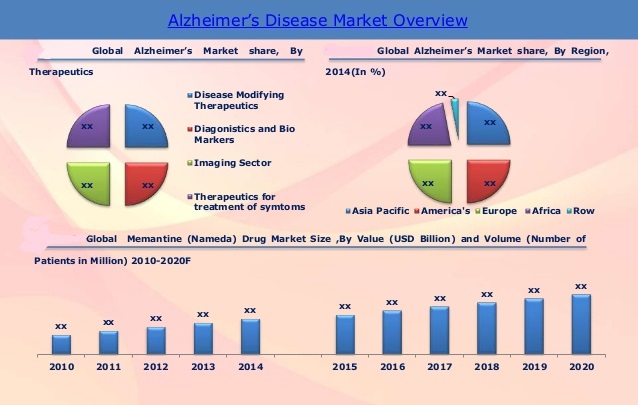
The global report for Alzheimer’s disease reached $10.2 billion in 2012 and still increasing. The global market for AD therapeutics and diagnostics by region should reach over $6.2 billion by 2020 from $4.4 billion in 2015, at a compound annual growth rate (CAGR) of 7.1% from 2015 to 2020.
Analyses of global market trends, with data from 2014, 2015 and 2016, and projections of CAGRs through 2021 has covered different types of tests, including esoteric, public health, anatomic technology, genomic testing, mass spectrophotometry, and other new technologies.
From an overview of the global market for laboratory-developed testing found that laboratory tests reached nearly $9.7 billion in 2015. This market is expected to increase from nearly $11.0 billion in 2016 to $14.9 billion in 2021 at a compound annual growth rate (CAGR) of 6.3% for 2016-2021.
Why in Osaka:
Dementia predominantly occurs in older people and, in view of the current demographic trend, has become a major issue for society and health policy. Currently around 130,000 people in Austria are suffering from some form of dementia and experts estimate that this number will double by 2050. Accounting for around 60 – 80% of cases, Alzheimer's disease is by far the most common form of dementia.
Osaka is the second biggest Metropolitan range in Japan. Glorify in the large number of individuals encountering mental issues excuse the perseverance of 40 affiliations and social orders subsidiary to Neuroscience in Osaka and Japan. Japan is dislodging towards contemporary brain research industry from its conventional "shinrigaku".
Otherwise called the "Country's Kitchen", Osaka is a noteworthy financial center point, facilitating almost 19 million individuals. The GDP in Osaka is about $341 Billion. Alongside Paris and London, it is a standout amongst the most gainful hinterlands on the planet. Osaka is the second most costly city for ostracize workers on the planet 2009.
Osaka is known for its cutting edge design, nightlife and healthy road nourishment. The sixteenth Century Osaka Castle is the real fascination in this city alongside the clamoring Umeda Underground Mall and Namba Park.
Conferenceseries LLC takes a great honor in announcing the commencement of 11th International Conference on Alzheimer’s disease and Dementia on May 24-25, 2018 at Vienna, Austria. Euro Dementia 2018 has received a benevolent response from all over the world. This has been conducted with the aim and the categorical intent of promoting the developments of new perceptions and ideas for exploring the high level of knowledge reached by scientific community on Neuroscience. The extremely illustrious conference hosted by Conferenceseries LLC was marked with the attendance of young and brilliant researchers, clinicians, business delegates and talented student communities.
The conference was organized around the theme “Future of Dementia & Alzheimer: Innovations and Research Outlook”. The event implanted a firm relation of upcoming strategies in the field of Neurology with the scientific community. The conceptual and applicable knowledge shared, will also foster organizational collaborations to nurture scientific accelerations.
This annual conference brought together eminent scientists, Neurologist, Neuroscience researchers, health care professionals, University professors, Neuroscience professionals in which many issues in Neuroscience research were discussed in depth to provide up-to-date information to the world. On the other hand, the meeting provided an opportunity for an open and animated sharing of ideas and experiences.
The conference witnessed an amalgamation of peerless speakers, who enlightened the crowd with their enviable research knowledge and on various alluring topics related to the field of Neuroscience. The eminent personalities at the conference were Don Kulasiri, Lincoln University, New Zealand, V R Badrakalimuthu, Parklands Hospital, UK, Manabu Tamura, Ministry of Economy, Trade and Industry, Japan, Arturo Solís Herrera, Human Photosynthesis® Research Centre, Mexico, Li Zeng, National Neuroscience Institute, Singapore, Nedim Ongun, Burdur State Hospital, Turkey, Ying Wang, China Pharmaceutical University, China, Mario Durán-Prado, University of Castilla-La Mancha, Spain, Santosh Bangar, MIND Clinic for Senior Citizens, India
Conferenceseries LLC offers its heartfelt appreciation to all the Organizing Committee Members, Chairs and Co-Chairs, Speakers, Students, Media Partners and Editorial Board Members of Journal of Alzheimers Disease & Parkinsonism, Journal of Neurology & Neurophysiology and Journal of Neurology and Neuroscience who supported the conference in every aspect for the awe-inspiring exhibition at the venue.
We once again thank you all for the enormous exquisite response. This inspires us to continue organizing events and conferences for furthering the neuroscience research. Conferenceseries LLC therefore, is glad to announce its 15th International Conference on Dementia and Alzheimers Disease scheduled during March 25-26, 2019 at Osaka, Japan. Mark your calendars for the upcoming meeting.
We are hoping to see you soon!
Conference Highlights
- Dementia
- Symptoms and diagnosis of dementia
- Dementia care practice & awareness
- Alzheimer’s disease diagnosis and symptoms
- Alzheimer’s imaging and clinical trials
- Alzheimer’s pathophysiology
- Parkinson’s disease
- Dementia with lewy bodies
- Frontotemporal dementia
- Wernicke-korsakoff syndrome
- Geriatrics care practice and awareness neuroscience
- Vascular dementia
- Amyloid protein in dementia
- Neurology and neurosurgery
- Therapeutic targets & mechanisms for treatment
- Animal models & translational medicine
To share your views and research, please click here to register for the Conference.
To Collaborate Scientific Professionals around the World
| Conference Date | March 25-26, 2019 | ||
| Sponsors & Exhibitors |
|
||
| Speaker Opportunity Closed | Day 1 | Day 2 | |
| Poster Opportunity Closed | Click Here to View | ||
Useful Links
Special Issues
All accepted abstracts will be published in respective Our International Journals.
- Journal of Neurology and Neuroscience
- Journal of Alzheimers Disease & Parkinsonism
- Journal of Neurology & Neurophysiology
Abstracts will be provided with Digital Object Identifier by



